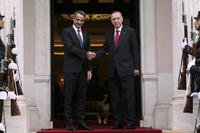A report out of the Middle East says Israel is close to a decision to attack Iran’s nuclear sites, a move that would have serious consequences for the U.S. and, in particular, American troops in the region.
While America's official stance has been to diplomatically try to dissuade Israel from striking Iran, the language of the re-election campaign often repeats threats of military action as President Obama vies with presumptive GOP candidate Mitt Romney for the donations and votes of Israel’s supporters.
Seemingly lost in the candidate speeches and political actions are the direct consequences to American troops should Israel actually bomb Iran.
“Idle rhetoric around political ideology on the part of some of the candidates puts [our troops] in danger and is not responsible,” said retired Army Gen. John Abizaid, who headed U.S. Central Command from 2003 to 2007. “This is a dangerous … What I would say is you’ve got to be very careful about letting rhetoric get in front of American interests.”
It’s no secret that candidates routinely trumpet their loyalty, fondness or passion for Israel to hold onto or gain contributions and votes from pro-Israel supporters. No better proof of that than the annual American-Israel Public Affairs Committee (AIPAC) gathering in Washington, where lawmakers flock en masse to speak or at least cheer speakers.
GOP presidential candidates lined up to speak at AIPAC’s conference in March, and Obama made his own appearance.
Obama said in March “all options are on the table” to prevent Iran from getting the bomb, including military force. The Israeli newspaper Haaretz reported in July that National Security Advisor Tom Donilon privately briefed Israeli Prime Minister Benjamin Netanyahu on America’s contingency attack plans. Israel denied it while the U.S. would not comment, the paper reported.
Obama also signed legislation granting Israel another $70 million to develop its Iron Dome missile defense system, an add-on that follows administration pledges not to touch the $3 billion in annual aid to Israel.
Romney, during his recent swing through Israel, broke with official U.S. policy to declare Jerusalem the capital of Israel and said he would “respect” an Israeli decision to unilaterally attack Iran.
He also insulted many Palestinians by attributing the economic disparity between Israel and the occupied territories to “culture” without acknowledging the people have lived under occupation since 1967. All his remarks were widely viewed as calculated to win favor with the more hawkish elements in Israel and the U.S.
Abizaid said campaign talk on the Middle East is superficial and aimed more at scoring political points than providing Americans with a clear picture of what is happening and what is in the national interest.
“A lot of the rhetoric is tied to the security of Israel and the desire to link our own politics to it,” said Abizaid, who teaches at and chairs the Combating Terrorism Center at West Point.
The Middle East is a complex region, and religious extremism is not limited to Shiite-dominated Iran, but also among some Sunni groups. Al-Qaida is one, but there are jihadists in Egypt, Mali, Algeria and Nigeria and elsewhere, he said.
Over the past decade, secular Arab leaders, right up through Hosni Mubarak of Egypt, have been falling, with the governments succeeding them still in doubt. Under the circumstances there may be too great an emphasis put on Iran, Abizaid said.
What is happening in these countries could pose more of a risk to Israel than Iran and it is the moderates throughout the region who have be supported and energized, Abizaid suggested
“Our and Israel’s interests is in helping moderates become ascendant,” he said. “This is a dangerous period and the rhetoric heats things up.”
Lawrence Korb, a Senior Fellow at the Center for American Progress and a former assistant secretary of defense during the Regan administration, said there’s probably no way to get candidates to ratchet back their Middle East rhetoric.
“It’s pretty tough now,” he said. It’s not helped by members of both parties pushing legislation that, if signed, calls for preventing Iran from having “the capability” of building a bomb, he said.
Any country with a nuclear program has the capability of developing a nuclear warhead, but the concern is that it would become the justification for striking Iran, Korb said.
“The fact is, if Israel does bomb Iran we’re going to be blamed … It’ll be accepted [throughout the region] that we told the Israelis to do it,” he said.
At the very least, Korb says the U.S. can expect Iran to retaliate against American troops by aiding insurgents fighting NATO troops in Afghanistan. Iran did this previously in Iraq, he said.
Ray McGovern, a former CIA analyst whose duties once included chairing National Intelligence Estimates and preparing the President’s Daily Brief, said the influence of pro-Israel donors and voters is too strong for candidates to ignore.
For that reason both the administration and the GOP prefer to play up how ready they are to use military force if Iran tries building a bomb rather than state clearly that U.S. intelligence finds no evidence that it is building one.
“It comes down to saber-rattling – ‘This is your last chance to stop doing what you’re not doing,’ “said McGovern, who in 2003 co-founded Veteran Intelligence Professionals for Sanity.








